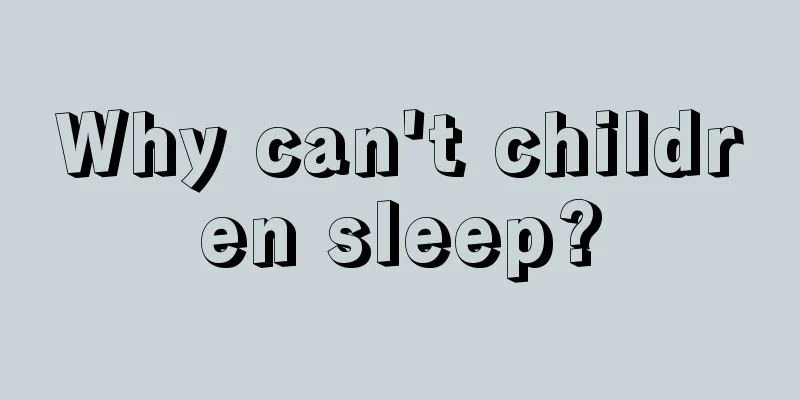Why can't children sleep?

|
There are many reasons why children can't sleep at night. If the baby does not have a cold or fever, if he can't sleep at night, it is either because he sleeps too long during the day, or he may be too excited to play before going to bed, or it may be caused by the baby's lack of trace elements. It is best to take the baby to the hospital for examination. If the disease is ruled out, it is generally best for parents not to let the baby sleep too much during the day.
Unlike adults who suffer from insomnia and toss and turn, children's insomnia also includes symptoms such as waking up at night, sleepwalking, and nightmares. 1. Night terrors Night terrors are a common form of insomnia in children. They refer to a short-term panic symptom that suddenly occurs during a baby's sleep. They are more common in children aged 5-6 years old. Between half an hour and two hours after falling asleep, the child suddenly sits up and screams, cries, stares or closes his eyes, with a facial expression that shows great fear and anxiety. Generally, children appear dazed when they have a night terror and do not respond to their parents' calls. After a few seconds to a few minutes, they will quickly fall asleep again. The next day, the child wakes up with no recollection or only a feeling of fear. The occurrence of night terrors is mainly related to the child's psychological and social factors, such as family discord, sudden separation from parents and relatives, unexpected changes in the home, severe reprimands and punishments from parents or teachers, listening to exciting stories or watching scary TV before going to bed, etc. 2. Sleepwalking Sleepwalking occurs within 3 hours after the onset of sleep. The child suddenly gets up during sleep, or walks or performs some familiar movements. He may not respond when you talk to him, or he may talk to himself. After a few minutes, he will return to bed by himself. When he wakes up the next day, he cannot remember what he did at night. For many sleepwalking children, the symptoms will gradually disappear as they grow up. This is the result of the gradual maturation of their central nervous system. However, for children who sleepwalk, doctors must rule out the possibility of temporal lobe epilepsy at an early stage. It is important to note that a sleepwalking child is at risk of injury, so if possible, wake him up before a sleepwalking episode. 3. Nightmare A nightmare refers to a child having a terrible dream with horrific content in the second half of the night, which wakes him/her up and causes him/her to feel extremely nervous and anxious. It is common in school-age children aged 8-10. Babies having nightmares will appear extremely frightened and tremble all over, and parents can easily sense their babies' nervousness. The difference between nightmares and night terrors is that children can be easily awakened from nightmares. After waking up, their consciousness quickly becomes clear, and they can clearly recall the dream they just had and feel very scared.
1. Affects the brain’s creative thinking Researchers once divided 24 children into two groups and asked them to take tests. The results of the two groups were the same. Then, one group of children was kept awake all night while the other group rested normally, and then the tests were conducted again. The results showed that the test scores of the no sleep group were much lower than those of the normal sleep group. Therefore, researchers believe that if a person wants to have clear thinking and quick response, he must have enough sleep. If he lacks sleep for a long time, the brain will not get enough rest, which will affect the brain's creative thinking and judgment ability to deal with things. 2. Affect growth and development A decrease in the baby's sleep quality will directly affect the body's growth and development: the baby's body is in the stage of growth and development, and poor sleep has a great impact on the development of the brain, which has great harm to the patient's physical and mental health. Some growth hormones in the body can only be secreted vigorously during sleep, promoting the growth of children's tissues throughout the body, especially bones. If children do not get enough sleep, they will become listless and have poor appetite, which will affect their growth and development.
Lack of sleep can cause people to feel anxious and worried, and their immunity can be weakened, which can lead to various diseases such as colds, neurasthenia, gastrointestinal diseases, etc. Researchers have found that lack of sleep can also cause increased blood cholesterol levels and an increased incidence of heart disease. Most of the cell division in the human body occurs during sleep. Lack of sleep or sleep disorders will affect the normal division of cells, which may cause mutations in cancer cells and lead to the occurrence of cancer. |
<<: What should I do if my baby doesn’t eat in summer?
>>: A 10-year-old boy can't sleep at night?
Recommend
What are the characteristics of rotavirus when it is almost cured?
Rotavirus is generally more prevalent in spring a...
What to do if your child has red eyelids
As children grow up, they will often suffer from ...
Why does a child drool?
Parents all hope that their children can grow up ...
How to treat sweaty baby feet
Some new mothers will find that their babies swea...
Can I turn on the air conditioner for a two-month-old baby?
There is still a little difference between a newb...
What are some methods to relieve cough in children?
Children often have symptoms of coughing. There a...
Developmental indicators of a two-year-old and nine-month-old baby
During the process of children's growth, pare...
What is the dosage of compound licorice oral solution for children?
Compound licorice oral solution can effectively h...
Middle school students masturbating several times a week does not affect their health
For middle school students, hormone secretion is ...
Chinese medicine for children's constipation
Constipation can happen to anyone, especially chi...
Children's waist erythema
There are many reasons for the appearance of eryt...
When should a child's circumcision be performed?
Many parents of children with foreskin that is to...
Can children soak their feet? What are the benefits?
The cold winter is coming soon. Many elderly frie...
What to do if your child has poor digestion and vomits
Nowadays, many families have only one child, so a...
What factors are related to children's coughing and bleeding?
Cough in children is one of the most common disea...









